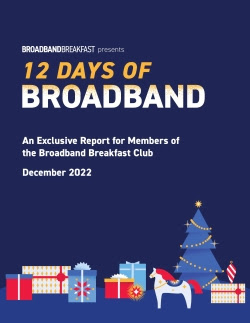How Long Will it Take Congress to Revamp the Universal Service Fund?
Critics urged the FCC to expand the fund’s contribution sources, but the agency chose to punt the decision to Congress.
Ahmad Hathout

The Federal Communications Commission this summer waived away the issue of revamping the Universal Service Fund, pointing to the need for Congress to give it the authority to make changes to the multi-billion-dollar fund that goes to support basic telecommunications services to low-income Americans and rural communities.
Up to this point, the agency had a virtual megaphone to its ear with critics saying that it needs to make the changes necessitated by the fact that the nearly $9-billion fund this quarter is supported only by dwindling legacy voice service revenues as more Americans move over to broadband-driven communications services.
The 12 Days of Broadband 2022 (click to open)
- On the First Day of Broadband, my true love sent to me:
A Symmetrical Gigabit Network - On the Second Day of Broadband, my true love sent to me:
24 Reverse-Preemption Pole Attachment States (2022 edition) - On the Third Day of Broadband, my true love sent to me:
Section Two-30 of the Communications Decency Act - On the Fourth Day of Broadband, my true love sent to me:
$42.5 billion in Broadband Equity, Access and Deployment funds - On the Fifth Day of Broadband, my true love sent to me:
5 Federal Communications Commissioners - On the Sixth Day of Broadband, my true love sent to me:
Wi-Fi 6E - On the Seventh Day of Broadband, my true love sent to me:
7.7% annual inflation rate - On the Eighth Day of Broadband, my true love sent to me:
8,132,968 census blocks and a national Broadband Fabric - On the Ninth Day of Broadband, my true love sent to me:
$9 Billion Universal Service Fund - On the Tenth Day of Broadband, my true love sent to me:
$10 Billion Remaining in the Affordable Connectivity Program - On the Eleventh Day of Broadband, my true love sent to me:
11th Year of Xi Jinping’s rule in China - On the Twelfth Day of Broadband, my true love sent to me:
12 or More State Broadband Officers
Over the past year, the conversation over what to do with the fund has reached ever-increasingly levels of urgency. The contribution percentage — the tax on voice service providers that is often passed down to consumers — climbs with the demands of the fund. In other words, there is an inverse relationship with taxed revenues and the contribution percentage — the lower the voice revenues to draw from, the higher the percentage demanded from fund, which is adjusted by the Universal Service Administrative Company every quarter.
Critics have urged the FCC to make significant expansions to the contribution sources of the fund, including taxing broadband revenues and forcing Big Tech to pay because they benefit from internet infrastructure.

Still others — including AT&T — have recommended that Congress step in and have the funds come from general taxation, which was met with concern that the fund’s pot of money would fluctuate with constantly changing political personnel.
Meanwhile, a bill that would require the FCC to study and report on the feasibility of having Big Tech pay into the fund made its way out of the Senate Commerce Committee in May. But nothing since.
Hence the concern as to what the FCC did when it temporarily handed the hot potato over to Congress — how long will it take?
Congress must move legislation forward, which takes months as it has other business to deal with. Even after the many months of bill passage, the FCC must draft its own proposal that must go through a public comment process.
This was the concern of critics who said the FCC already has the legal authority to act unilaterally, without the intervention of Congress to get the process started. One of those critics includes Carol Mattey, former deputy chief of the FCC, who last year published a report saying the agency must expand the contribution base to include broadband revenues.
Following the report’s publishing, Mattey and advocate Public Knowledge argued that the FCC has the legal authority to expand the base on its own.
But in the FCC report to Congress on the USF this summer, the agency wasn’t so sure.
“On review, there is significant ambiguity in the record regarding the scope of the Commission’s existing authority to broaden the base of contributors,” the report said.
“As such, we recommend Congress provide the Commission with the legislative tools needed to make changes to the contributions methodology and base in order to reduce the financial burden on consumers, to provide additional certainty for entities that will be required to make contributions, and to sustain the Fund and its programs over the long term.”
The deference to Congress pleased the two Republicans on the commission, Brendan Carr and Nathan Simington, both of whom — no less interested in the sustainability of the fund — preferred the legislative body make the determination.











Member discussion